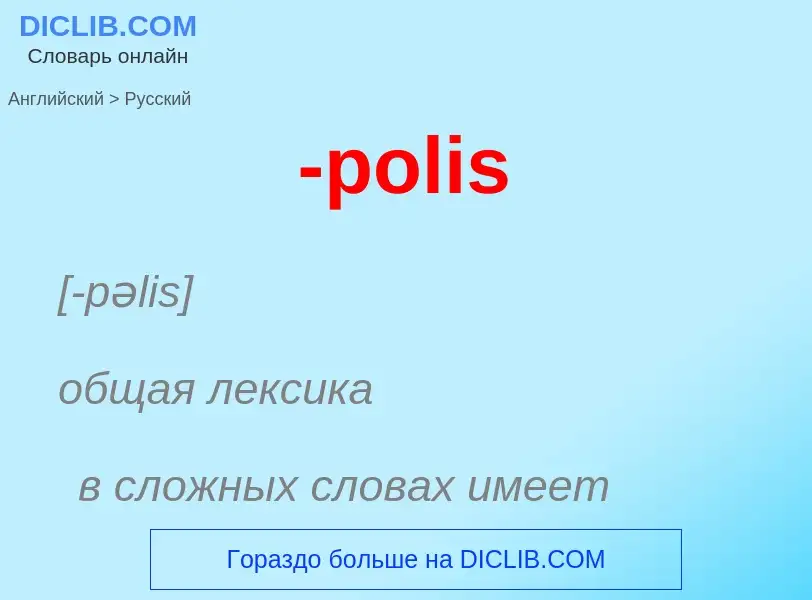Translation and analysis of words by ChatGPT artificial intelligence
On this page you can get a detailed analysis of a word or phrase, produced by the best artificial intelligence technology to date:
- how the word is used
- frequency of use
- it is used more often in oral or written speech
- word translation options
- usage examples (several phrases with translation)
- etymology
-polis - translation to russian
[-pəlis]
общая лексика
в сложных словах имеет значение город
['pəulis]
существительное
общая лексика
полис
город-государство (в Древней Греции)
Definition
Wikipedia

Polis (, US: ; Greek: πόλις, Ancient Greek pronunciation: [pólis]), plural poleis (, πόλεις, Ancient Greek pronunciation: [póleːs]), means ‘city’ in Greek. In Ancient Greece, it originally referred to an administrative and religious city center as distinct from the rest of the city. Later it also came to mean the body of citizens under a city's jurisdiction. In modern historiography the term is normally used to refer to the ancient Greek city-states, such as Classical Athens and its contemporaries, and thus is often translated as ‘city-state’. The poleis were not like other primordial ancient city-states such as Tyre or Sidon, which were ruled by a king or a small oligarchy; rather, they were political entities ruled by their bodies of citizens.
The Ancient Greek poleis developed during the Archaic period as the ancestors of the Ancient Greek city, state and citizenship and persisted (though with decreasing influence) well into Roman times, when the equivalent Latin word was civitas, also meaning ‘citizenhood’, whilst municipium in Latin meant a non-sovereign town or city. The term changed with the development of the governance centre in the city to mean ‘state: (which included the villages surrounding the city). Finally, with the emergence of a notion of citizenship among landowners, it came to describe the entire body of citizens under the city's jurisdiction. The body of citizens came to be the most important meaning of the term polis in ancient Greece.
The Ancient Greek term that specifically meant the totality of urban buildings and spaces is asty (ἄστυ). The Ancient Greek poleis consisted of an asty built on an acropolis or harbour and controlling surrounding territories of land (χώρα khôra). The traditional view of archaeologists that the appearance of urbanisation at excavation sites could be read as a sufficient index for the development of a polis was criticised by French historian François Polignac in 1984 and has not been taken for granted in recent decades: the polis of Sparta, for example, was established in a network of villages. The Ancient Greeks did not always refer to Athens, Sparta, Thebes and other poleis as such; they often spoke instead of the Athenians, Lacedaemonians, Thebans and so on.

![[[Acropolis of Athens]], a noted ''polis'' of classical Greece. [[Acropolis of Athens]], a noted ''polis'' of classical Greece.](https://commons.wikimedia.org/wiki/Special:FilePath/Attica 06-13 Athens 50 View from Philopappos - Acropolis Hill.jpg?width=200)
![Syracuse]], a classical ''polis''. Syracuse]], a classical ''polis''.](https://commons.wikimedia.org/wiki/Special:FilePath/Theatre at Syracuse, Sicily.jpg?width=200)
